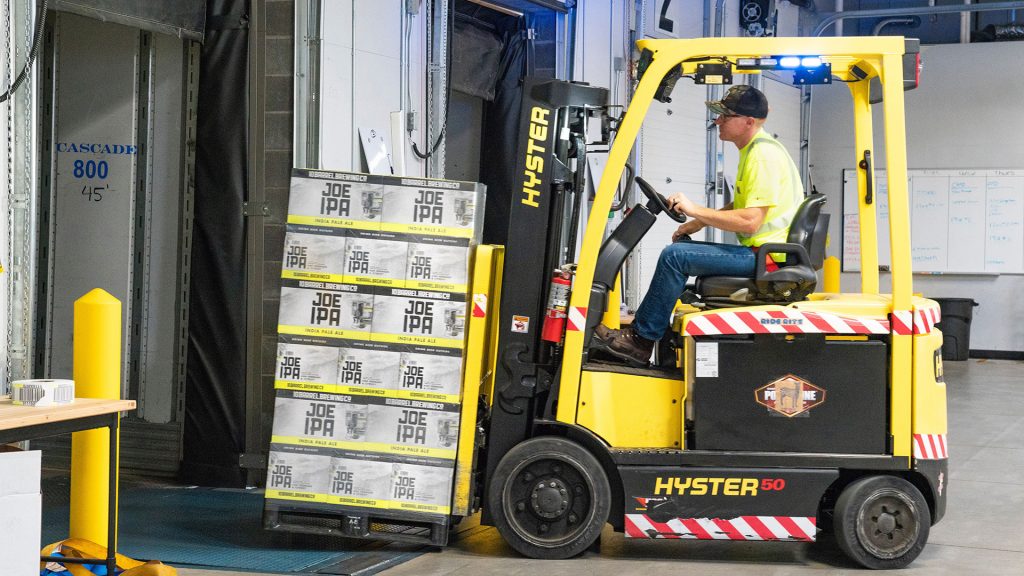Project Insights Report
Material Handling 4.0
 Executive Summary
Executive Summary
Material Handling 4.0 (MH4.0) is a sector-based skills training program designed to prepare unemployed and underemployed individuals for roles in Canada’s goods movement industry. Developed by Mohawk College, MH4.0 addresses the growing demand for technical and employability skills driven by Industry 4.0 (fourth industrial revolution) innovations such as artificial intelligence, robotics and interconnected digital systems. Delivered across four colleges, the program provides technical training, micro-credentials, work placements and wraparound supports to help participants transition into good-quality jobs. From 2020 to 2022, MH4.0 engaged 238 participants, reaching 98% of its recruitment target and achieving a 90% completion rate. Participants reported high satisfaction with program staff and moderate satisfaction with program components. Participant employment rates rose significantly, from 26% at baseline to 64% nine months post-program. MH4.0 provides key lessons on designing and scaling a sector-based model. It may ultimately help Canada’s workers secure and maintain employment, and help Canada’s goods movement stay resilient in the face of labour market disruptions.
Key Insights
Employment rates increased from 26% at baseline to 64% nine months post-program, with weekly earnings rising by 56%, from $465 at baseline to $723 at nine months.
Participants valued micro-credentials and work placements but reported challenges articulating their value to employers and some dissatisfaction with work placement relevance.
MH4.0’s flexible model allowed colleges to adapt program supports to local needs, such as Indigenous-focused supports at RRC Polytech (formerly Red River College) and American Sign Language interpretation at Nova Scotia Community College.
 The Issue
The Issue
The goods movement sector is undergoing significant transformation—the evolution of disruptive technologies is creating barriers to success for those not participating fully in Canada’s labour force. Industry 4.0 represents a new reality that relies on networks of machines capable of autonomously exchanging information in a way that minimizes human involvement. The implications of this revolution are widespread, particularly in the supply chain sector, as many new skills are required by people working in this sector to manage and oversee the new technology. This creates demand for workers with advanced technical skills, employability skills and certifications.
However, many unemployed or underemployed Canadians face barriers to entering this sector, including limited access to training and recognized credentials.

 What We Investigated
What We Investigated
MH4.0 was designed to address these gaps by offering a dual-client model that benefits both employers and job seekers—with a focus on equity-deserving groups such as youth, women, newcomers, low-income earners and people without postsecondary education. The MH4.0 model included technical training and employability skills training over six weeks; industry certifications and micro-credentials; optional two-week work placements; and wraparound supports like financial help, academic support and childcare.
The evaluation of the MH4.0 program explored participant experiences, outcomes and the scalability of the program across different sites. Using a longitudinal mixed-methods approach, data were collected from 238 of the targeted 243 participants across 21 of the targeted 18 cohorts. Surveys were conducted at baseline, program exit and three-to-nine-month follow-ups. Interviews were also conducted with participants, staff and employers, while administrative data provided insights into recruitment, completion and program delivery. This approach aimed to assess program satisfaction, employment outcomes, skills assessments and the scalability of sector-based models.
 What We’re Learning
What We’re Learning
MH4.0 successfully reached its target populations, as 77% of participants reported household incomes below $40,000, and 88% identified as youth, newcomers or individuals without postsecondary education. Participants reported high satisfaction with staff support but lower satisfaction with specific components like work placements and micro-credentials.
Employment outcomes improved significantly, with 64% employed nine months post-program compared to 26% at baseline. Work placements were a critical driver of employment outcomes, with participants who completed placements 3.5 times more likely to be employed at program exit. However, challenges remain in scaling access to work placements and ensuring that the value of micro-credentials is understood by employers.
Overall, MH4.0 provides six key lessons on designing and scaling a sector-based model:
1. Include a research phase: The research carried out by Mohawk College, the Ontario Centre for Innovation and Hamilton-Oshawa Port Authority created a solid foundation for MH4.0 by identifying labour demand and skills needs at the port. This helped Mohawk College choose a target industry and select training content and certifications relevant to employers.
2. Select partners carefully: Mohawk College carried out research on local labour markets to identify goods movement hubs and suitable partner colleges located nearby. This enabled Mohawk College to scale MH4.0 in locations in which it had a good chance of success, where participants would find work in the local goods movement sector and partner colleges would be able to implement the core components of the model.
3. Ensure flexibility: MH4.0 struck a balance between maintaining a stable, codified core model and allowing partner colleges to offer additional non-core support services. This flexibility meant that partner colleges were able to tailor the model to respond to local needs, which proved important, as the four sites served different learner bases.
4. Build on existing industry-recognized training content and certifications: MH4.0 builds on existing training content and certifications developed by the American Association of Colleges and Universities (i.e., VALUE rubrics), the Manufacturing Skills Council (i.e., training content) and the Manufacturing Skill Standards Council (i.e., industry certifications, like the Certified Logistics Associate certification). By leveraging existing content and qualifications, Mohawk College ensured that training and certifications were relevant to employer needs, and that employers would recognize and value them.
5. Ensure employers and participants understand and value micro-credentials: Mohawk College used the VALUE rubrics, a well-established and widely recognized framework, as a basis for their new micro-credentials. But the lack of understanding of the credentials among both employers and participants points to a need for stronger engagement to generate buy-in from employers and better explanation to participants to boost their confidence in their new qualifications. There is also a related need to strike the right balance between site independence to award micro-credentials and cross-site consistency to promote a common standard of competency. Calibration and quality assurance practices can be helpful, but ultimately site assessors may have different interpretations of assessment criteria.
6. Offer work placements: Most participants who completed a work placement were satisfied with it, and participants noted that work placements were important for gaining practical and Canadian experience. Further, participants who completed a work placement were significantly more likely to be employed at program exit. This is consistent with the literature on sector-based models and findings from other projects supported by the Future Skills Centre, which demonstrate that work placements are key contributors to employment outcomes.
 Why It Matters
Why It Matters
Sector-based models like MH4.0 are essential for addressing skills shortages and creating accessible pathways into high-demand industries. By combining technical training, wraparound supports and employer engagement, MH4.0 offers a scalable model for workforce development. By generating and sharing these lessons, Mohawk College and partners are making a significant contribution to the goal of enabling and empowering other colleges, service providers and training organizations to develop their own sector-based models in response to different and diverse labour market needs.

State of Skills:
Evaluation and Learning in the Skills and Training Ecosystem
The Future Skills Centre’s approach to evaluation and learning has evolved over time, reflecting the challenges of measuring social impact.
Have questions about our work? Do you need access to a report in English or French? Please contact communications@fsc-ccf.ca.
More from FSC
Skills for Infrastructure Innovation
Bridging the Digital Skills Gap: Alternative Pathways
How AI is shaping the future of work
How to Cite This Report
Blueprint. (2025). Project Insights Report: Mohawk College, Material Handling 4.0. Toronto: Future Skills Centre. https://fsc-ccf.ca/projects/material-handling/
Material Handling 4.0 is funded by the Government of Canada’s Future Skills Program. The opinions and interpretations in this publication are those of the author and do not necessarily reflect those of the Government of Canada.




